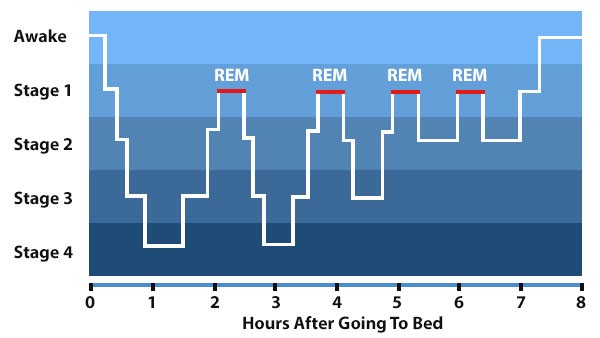 Image by Nato Pereira | Pixabay
Image by Nato Pereira | Pixabay
If you?re a night owl and you?ve tried waking up early, you know it?s one of the most difficult habits. It?s a pain in the ass to deal with grogginess in the morning and to be in bed on time with all the digital distractions nowadays.
You probably already read a few articles (or books) on sleep and early rising. In those, you see the usual advice:
- have a consistent schedule on weekends
- don?t use electronics late at night
- eliminate blue light
- don?t eat late dinner
- have a morning/bedtime routine
All these points are important and they?ve been discussed to death everywhere on the internets. Instead, I want to talk about some less known, ?ninja? tips that will make you an early riser faster. I?ve been coaching people on the waking up early habit for more than two years now, and there are few of those that pop up constantly.
1. Don?t Jump Out of Bed Immediately
The usual advice with the alarm is to keep it far away and immediately jump out of bed when it goes off.
That approach works well in the military, but what if you don?t want to have that stressful schedule in your every-day life? What if you want to enjoy your morning and spend some time in bed before jumping into work?
If you want to do a habit long term it has to feel good. You?re not going to make it very far if your new habit feels horrible, and that?s exactly how it feels when you jump out of bed groggy.
So how can you spend time in bed without falling back asleep?
Have a two-alarm setup.
The first one is to wake you up, the second one is your cue to get out of bed. The first one should be within arm?s reach and the second one should be away from your bed.
That way, you can give your body some time to gently awaken and you can spend some quiet time in bed doing something you love, like reading your favorite novel, writing in your journal, or doing affirmations.
When the second alarm goes off your time is up and you have to get out of bed. A 10 or 15-minute period before the first and the second alarm works well. By that time your body will feel much better and you would have gotten some inspiration by doing your favorite thing in the morning.
My setup is a silent Fitbit alarm that wakes me up and my phone alarm goes off 10 minutes later. I use that 10 minutes to cuddle with my girlfriend ? a great way to start the day.
2. Start Your Day with Joy
We?ve been conditioned by the productivity movement that everything should be about getting things done. Do more, faster, increase efficiency. Most of our morning routines are filled with activities that require willpower and discipline.
But getting out of bed is much easier if you have something that you?re looking forward to. Something that gives you joy and excites you.
It might be doing a morning walk in the park, walking your dog, getting a cup of coffee at your favorite caf, spending time with your loved ones.
It?s different for everybody but whatever it is, make sure there?s at least one activity every morning that is just to excite you and improve your mood. That indirectly will make you more productive for the rest of the day.
3. Have A Strong Reason ?Why??
?I heard that early risers are happier and more productive,? is not a good reason. It?s too general and will not inspire you to take action.
Changing this habit is hard, and if you want to endure the difficulty, you will need a good reason for it. Be really clear about what you want to get out of the extra morning time.
Do you want to use it to work more on your business? To improve your fitness and health? To get some extra time with your friends and loved ones? To make more time for learning and reading?
If you don?t come up with a good way to spend your mornings, they will automatically be allocated for sleeping in.
Planning it in advance is also very important. Coming up with the right thing to do at 6 AM when you?re feeling groggy isn?t going to work. At that time your mind will always come up with the same priority: sleep more.
Before you even start waking up early, come up with a great plan about how you?re going to use that extra morning time.
4. Hire a personal habit-building coach (It?s not as expensive as you think)
The statistics of one of the top habit tracking apps Lift showed that people using a coach had a 300% better chance to master a new habit than the ones trying to do it on their own ? that?s how important accountability is.
The problem is that it?s hard to find a friend that cares enough to hold us accountable, at least not long-term.
Well, thanks to technology, nowadays it?s easy to find and hire a professional coach that specializes in the habit or goal you want to achieve. And believe it or not, you can do so for as little as $25/week using the Coach.me coaching platform.
You can even sign up for a 3-day free trial and see if it?s the right fit for you before you commit here: www.coach.me/coaching
5. Plan Your Mornings with Excruciating Detail
The more specific you are with your morning routine, the easier it?s going to be to execute it. I?m talking about the really small details.
Where do you put your alarm? Do you get dressed before going to the bathroom? Do you shave first or brush your teeth first? Do you take a shower in the morning or in the evening?
Also, the better defined your routine is the more efficient it?s going to be. Since you?re doing the same thing every day, you will find many ways to optimize it.
After writing down my routine in detail, I figured out that laying out my clothes for the next day is much better than doing it when I wake up. It saves time and it feels nice to have everything ready when you wake up. I imagine it?s going to save even more time for the ladies.
When I saw the routine written on paper I also noticed how many unnecessary trips I was making back and forth to different rooms. First, because I didn?t do it in the right order and second because I would forget something and then have to go back.
Here?s my morning routine in detail:
- Turn off the second alarm
- Do my business in the bathroom (1 min)
- Go to the kitchen and weigh in on the scales (1 min)
- Drink a glass of water (1 min)
- Go back to the bathroom
- Take off retainer (1 min)
- Put on lenses (1 min)
- Brush teeth, Tongue scrape, Mouthwash (3 mins)
- Shave (3 mins)
- Put on perfume
- Style hair (1 min)
- Put on clothes (3 mins)
- Hit the door
It seems like a big list, but since I do exactly the same thing every morning I?ve optimized it so it takes just 15 minutes.
6. Lend or Give Away Your Electronics
6 years ago, when I was really struggling with waking up early, something happened that made me an early riser in just 3 days ? my computer died. It was as easy as that.
I had no TV, smartphone or tablet at the time, so there was nothing keeping me up late at night. The only electronic I had was an iPod which I used to listen to audio books and that only helped me fall asleep faster. Since I fell asleep early, I started getting enough sleep and naturally started waking up early.
Going through that period without a computer and effortlessly becoming an early riser, helped me realize that waking up early is our natural state. We don?t have to do anything extra to be early birds, we just need to eliminate the obstacles.
If you?re committed to succeeding at this habit, get rid of all the electronics. Don?t just turn them off, that never works. There is nothing stopping you from turning everything back on when you?re feeling bored at night and can?t fall asleep.
Lend your tablet to a friend for a few weeks. Get rid of the TV. Switch to an old school phone, where the only distraction is playing the Snake game.
It?s an extreme step and getting rid of all electronics will be challenging. Also, it?s not realistic to make it a permanent change. But doing it for a few weeks will help you get a great start with this habit.
It?s like learning to ride the bike with training wheels, it eliminates the chance to fall down. Getting rid of the electronics eliminates the chance to be tempted and stay up late.
7. Staying Awake After Getting Out of Bed
Many people manage to get out of bed early, but an hour later they still feel groggy and go back to sleep.
Changing your wake-up time to a few hours earlier is hard. While your body gets used to the new timing, you will feel sleepy in the first few hours and going back to sleep will be tempting. Especially if you?re still at home with your cozy bed seemingly doing a come-hither gesture, just like in a Disney movie.
Even coffee doesn?t help in that case. I?ve tried getting two strong cups of coffee when feeling groggy and I can still keep snoozing for a few more hours.
So what?s the solution?
Go outdoors as soon as possible. Do a quick morning routine to refresh yourself and hit the door immediately.
Something about being outdoors makes it easy to stay awake. Feeling the cool air on your skin, smelling the grass and flowers, hearing the rustling leaves. Nature tends to melt away all the grogginess.
It?s a great opportunity to do some exercise too, which is one of the best ways to start your day. Get your heart rate up.
8. Get a Pet
Accountability is becoming mainstream. Getting friends and family to keep you in check helps a lot. Hiring a coach or making a financial commitment on sites like stikK.com is great too. But there is no better accountability than a hungry cat in the morning.
If you get a cat and show her that 6 AM is food time, she will make sure you?re preparing breakfast at 5:55 AM every morning. No exceptions.
The downside to that approach is that she might also decide she wants some play time at 3 am, but oh well? cats will be cats.
9. Use Sleep Cycles to Your Advantage
Have you had one of those days where you wake up early, but you don?t feel sleepy or groggy? You can fall back asleep easily but you can also get up and start your day. Feels great, doesn?t it?
Of course, you also know about the other mornings. Mornings where waking up early is terrible: your mind is foggier than the Golden Gate bridge and your body feels like it?s been run over by an 18 wheeler. Several times.
The difference between those two cases is the sleep cycles. When we sleep at night we experience a few cycles that our bodies go through. Each cycle passes through different stages, illustrated on the graph below.

Stage 4 is the deepest one and Stage 1 (REM) is the lightest one, meaning the closest one to the awake state. The closer to the awake state you are when the alarm goes off the better you will feel. The deeper you are the worse you will feel.
So how can you use that to your advantage?
Figure out at which time in the morning you?re in REM sleep. If you feel terrible when the alarm goes off at 7 am, try 7:30 instead. If that doesn?t work, try 8 am. Eventually, you?ll find the sweet spot and you?ll be able to get up much more easily.
Once you find that sweet spot, you can begin gradually moving your alarm back by 10?15 minutes earlier, and shift your sleep cycles until you hit your target wake-up time.
This approach works only if you have consistent bedtimes. If you change the bedtimes by 1?2 hours every day, the sleep cycles will change too, and you won?t be able to find that stability in the morning.
10. Have Realistic Expectations
One of the most frequent questions that I get is, ?How long does it take to become an early riser??
It only takes your body 4?5 days of waking up and going to bed at the same time to adjust to the new schedule. It works even if it?s a big change, like moving in a different time zone.
However, getting yourself to do those 4?5 consistent days is a different story. Being able to do it depends on your current habits.
If you?re used to watching Netflix while overeating until 2 AM, and you try shifting your bedtime to 10 pm, it?s going to be a big challenge. In that case, you have to change two additional habits ? the overeating and the late TV watching. That takes additional time and discipline.
Becoming an early riser is difficult because it?s not just one habit but a combination of many tiny ones. That?s why shifting the sleep schedule gradually works better than cold turkey. It allows you to gradually improve the other prerequisite habits at the same time.
11. Get Enough Sleep or Maintain Consistent Wake-Up Times?
You already know that consistent wake-up and bedtimes are crucial to becoming an early riser. However, we don?t live in a perfect world. Sometimes our priorities change and we have to stay up late.
In those cases, we have two choices for the morning after: 1) keep the same alarm time even though we?ll get less sleep, or 2) turn off the alarm and get enough sleep.
The best choice depends on how late you go to bed.
1) If you go to bed late but still get at least 5?6 hours, then it?s better to maintain the same alarm time. You will feel a bit sleepy during the day, but you can always get a power nap in the afternoon to help the process. You can also go to bed a little earlier the following evening to catch up even more.
Maintaining the wake-up time will make it easier to stay on track for the next few days, even though you had one late night.
On the other hand, if you were to change your alarm every time just to make sure you?re getting enough sleep, you will have a much more inconsistent schedule. You might end up sleeping 2?3 hours longer. Then on the following evening, you?ll not feel sleepy enough at the usual time, and you?ll stay up late again. The whole thing turns into a negative spiral.
A good rule of thumb is, ?Regulate the amount of sleep by adjusting the bedtime, not the wake-up time.?
2) The second scenario is when you go to bed very late and keeping the typical alarm time means you?ll only get 1?2 hours of sleep.
In that case, you?ll be better off sleeping in.
Even if you woke up on time, with so little sleep you?ll end up spending the day like a zombie, struggling to stay awake. So instead, turn off the alarm and let your body wake you up naturally. Then make sure you put some extra effort to be in bed on time on the following evening.
It?s likely that you won?t feel sleepy at your usual bedtime, so you can get some melatonin to ease the falling asleep.
Originally published at georgehalachev.com on April 18, 2017.


